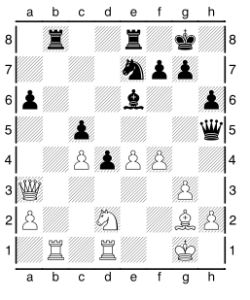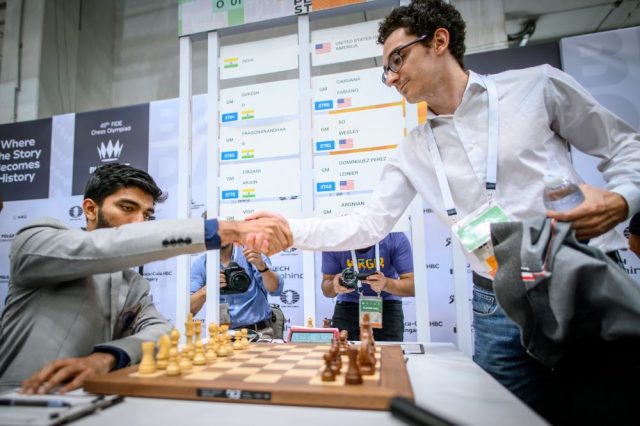Today we will see the game which enabled Team India to achieve the extraordinary feat of winning gold in the Open section of the Chess Olympiad.
For the first time in history, the Indian Chess team won both the Open and Women’s Section gold at the Chess Olympiad. It was not a surprise for the second-seeded Men’s team but the Women’s team also showed tremendous resistance to win the title.
The Men’s team confirmed their gold with one round to go. In the first ten rounds, Team India won 9 matches and drew only one, thereby taking their tally to 19 points, two points ahead of the nearest rivals, China.
In round 10, Team India faced the top seed U.S.A, led by World No. 3 and former World Championship candidate Fabiano Caruana. The top board match between World Championship challenger D. Gukesh and Fabiano Caruana turned out to be the game that ensured a gold medal for India.
Analysis of the game move by move (time given in bracket is the time taken for the move in minutes and seconds)
D Gukesh (2764) – F Caruana (2798)
45th FIDE Chess Olympiad Budapest (10.1), 21.09.2024
1.d4 [5]Nf6 [4]2.c4 [5]e6 [3]3.g3 [6]d5 [27]4.Bg2 [7]Nc6 [12]
A comparatively unknown variation which has not had good results. It is difficult to understand the reason for the choice but certainly a part of long-term preparation.
5.Nf3 [2:36]Rb8!? [24]
This is an extremely rare move which has been played only 9 times before. In fact, I was not aware of this possibility till yesterday.
6.cxd5 [13:46]
After a long thought. Gukesh decides to clarify the centre, to limit the opponent’s possibilities.
6…Bb4+ [15]
This theoretical ‘Novelty’ (New Move) is the first choice of the Chess playing engines. It is clear that at this stage, it was only the American who was familiar with the position.
7.Nc3 [21]exd5 [9]8.Bg5 [3:04]h6 [4:16]9.Bxf6 [10]Qxf6 [16]10.0–0 [3:27]Bxc3 [2:34]11.bxc3 [6]0–0 [10]
Black seems to have solved the opening problems, as per the evaluation of the engines. However, from a human point of view, the opening doesn’t look like a great opening choice for Black as he has no clear plan. White, on the other hand, has several plans, (a) to gain better central Pawn structure with c3–c4 break (b) to try to gain initiate with e2–e4 break (c) to try for f2–f3 followed by e3–e4. As it is practically impossible to force the third plan, White has to choose between plan (a) or plan (b). It became obvious at this stage that the World No 3 was playing for a draw by preventing the World Championship Challenger’s plans of aggression.
12.Nd2 [4:35]Ne7 [5:55]13.e3 [2:25]
Playing it cautiously.13.e4 would have been more direct.
13…Be6 [12:11]14.Qa4 [12:53]a6?! [2:35]15.e4! [4:13]
This break opens up the position when the Black pieces, particularly the Q and QB are vulnerable to attack by White’s Knight.
15…c5? [21:50]
This attempt to create counterplay against White’s centre Pawns turns out to be a serious mistake. It was necessary to exchange the Pawns in the centre immediately.

16.Qa3! [1:06]b6 [3:13]
[16…cxd4? loses to 17.e5! Qxe5 18.Qxe7 dxc3 19.Nf3 Qh5 20.Rac1 etc.]
17.Rab1 [11:16]Rfe8 [16:45]
Black gives up a Pawn to reduce the tension in the centre.
Trying to guard the Qside Pawns with 17…Rfc8 would have led to almost a ‘Zugzwang’ after 18.Rfe1!
18.dxc5 [12:21]d4!? [1:31]
Playing for counterplay by ‘Piece play’ but this attempt boomerangs as Gukesh is much superior in calculating unforced tactical variations.
19.c4 [12:25]Qg5 [2:45]20.Rfd1 [51]bxc5? [3:45]
20…Qxc5 21.Qxa6 d3 would have led to an unclear position, with adequate compensation to Black for the material deficit.
21.f4! [45]Qh5 [2:55]

22.f5! [37]
Suddenly the Black Queen finds herself in danger as well as out of battle-field.
22…Rxb1 [6:15]23.Rxb1 [2]Qe2! [16]
Forced.23…Bd7 is unplayable due to 24.Nf3 Bc6 25.Re1!
24.fxe6 [3:38]Qxd2 [5]25.exf7+ [3:21]Kxf7 [3]26.Qxc5 [1:22]
The smoke has cleared and White has emerged with an edge. White has material superiority and Black has a weak King. However, things are not easy as Black has a dangerous central passed Pawn and the White Bishop is hemmed by the ‘e4’ Pawn.
26…Kg8 [1:07]27.Rf1 [37]Kh7 [1:42]28.Qe5! [4:28]
Pinning the Knight on ‘e7’ as well as threatening Re7 after due preparation.
28…Qe3+ [1:59]29.Kh1 [2]d3! [5]
Objectively, Black has done very well. Black has adequate compensation. Probably an Engine Vs Engine match will end in a draw here but between humans, the better tactician is likely to outsmart the opponent.
30.Bh3 [1:34]d2?! [5:13]
A slight inaccuracy as it allows activation of the WB. However, Black is fine even after this inaccuracy.The Chess playing engines show that 30…Qe2! was correct and would have held the game. For example, 31.Rf7 Qd1+! 32.Kg2 Qc2+! 33.Kg1 33…Qc1+ 34.Rf1 d2 35.Bg4 Rd8 36.Rd1 Qa3 37.c5 Ng6 etc. But it is impossible to find out these moves and Caruana’s choice seems to be fine.
31.Bg4! [12]Qd3 [36]32.Kg2 [11]Qxc4 [6]
Black has restored the material balance.
33.a4!? [2:04]Qc6?! [2:44]
[33…Qxa4 34.Bh5 34…Qc4 35.Rd1 Qd3 would have simplified to a drawish position.]
34.Qd4 [1:01]

34…Qg6?? [1:27]
The losing move! 34…Ng6! was possible and perfectly fine but no human would be comfortable after the permanent pin 35.Bf5 Surprisingly Black can hold here due to the powerful ‘d2’ Pawn. 35…Qc2! 36.Kf3! Rf8 37.Ke3 Qc1! 38.Ke2 Kh8! 39.Qxd2 Qc4+ 40.Qd3 Qb4! 41.Bxg6 Qb2+ 42.Ke3 Qb6+! with a Perpetual Check!
35.Rf4! [1:17]Qg5 [2:24]
[35…h5? 36.Bxh5]
36.h4! [27]Qg6 [1:25]37.Qxd2 [2]Rb8 [23]38.Qd7 [1:03]h5 [47]
39.Be6 [45]Rb6 [32]40.Bf7 [30]Qd6 [7]41.Qxd6 [1:21]Rxd6 [0]
The rest needs no comments.
42.Bxh5 [0]Nc6 [0]43.Be2 [5:55]a5 [20]44.Bb5 [44]Ne5 [2:03]
45.Rf5 [0]Re6 [0]46.Kf2 [0]
Black resigned.1–0




